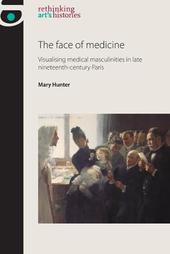
|
The Face of Medicine: Visualising Medical Masculinities in Late Nineteenth-Century Paris
Hardback
Main Details
| Title |
The Face of Medicine: Visualising Medical Masculinities in Late Nineteenth-Century Paris
|
| Authors and Contributors |
By (author) Mary Hunter
|
| Series | Rethinking Art's Histories |
|---|
| Physical Properties |
| Format:Hardback | | Pages:280 | | Dimensions(mm): Height 234,Width 156 |
|
| Category/Genre | Art and design styles - c 1800 to c 1900
Painting and paintings
Art treatments and subjects |
|---|
| ISBN/Barcode |
9780719097577
|
| Classifications | Dewey:758.961 |
|---|
| Audience | | Professional & Vocational | |
|---|
| Illustrations |
60 black & white illustrations
|
|
Publishing Details |
| Publisher |
Manchester University Press
|
| Imprint |
Manchester University Press
|
| Publication Date |
1 December 2015 |
| Publication Country |
United Kingdom
|
Description
This book examines the overlapping worlds of art and medicine in late-nineteenth-century France. It sheds new light on the relevance of the visual in medical and scientific cultures, and on the relationship between artistic and medical practices and imagery. By examining previously unstudied sources that traverse disciplinary boundaries, this original study rethinks the politics of medical representations and their social impact. Through a focused examination of paintings from the 1886 and 1887 Paris Salons that portray famous men from the medical and scientific elite - Louis Pasteur, Jules-Emile Pean and Jean-Martin Charcot - along with the images and objects that these men made for personal and occupational purposes, Hunter argues that artworks and medical collections played a key role in forming the public face of scientific medicine. -- .
Author Biography
Mary Hunter is Associate Professor of Art History at McGill University -- .
Reviews'I highly recommend this book. The very rich material examined and Hunter's original analyses make The Face of Medicine a very informative and enjoyable read, especially for historians who are not familiar with working with images.' Beatriz Pichel, PHRC, De Montfort University, UK, Medical History (60.4) October issue 'This is an importantcontribution to our understanding of the provenance and operation of realistmodes of representation in medical iconography in France at the beginning ofthe Third Republic.' Robert A. Nye, OregonState University, H-France Review 'Mary Hunter's The Face of Medicine crosses theboundaries of medical humanities, art history, gender and museum studies, andFrench history. Demonstrating the symbiosis between medical and artisticpractices, Hunter offers a fascinating insight into the visual culture ofmodern medicine by examining the portraits of well-known late-nineteenthcentury, French medical elites Louis Pasteur, Jean-Martin Charcot, andJules-Emile Pean. Reinterpreting medical portraiture beyond its aestheticvalue, Hunter argues that the production of scientific knowledge on a widevariety of visual materials-portraits, anatomical models, photographs,caricatures-was central to the conceptualization of a male-focused idea ofscientific progress.' David B. Levy, Journal of the Historyof Medicine and Allied Sciences '...Mary Hunter's examination of medicalmasculinities in late nineteenth-century Paris is unique, and a most welcomeaddition to the corpus of historical writings on art and medicine...The Face of Medicine successfullydemonstrates how the "scientific and medical personae and narratives" depictedin the examined artworks "shaped artistic decisions regarding style,composition, genre, and medium" (242). Moreover, throughout the book Hunter'svisual analysis seems both precise and insightful.' Kathryn Simpson, Independent Scholar, CAA reviews 'Realism' is a central concern of The Face of Medicine, and in an extended introduction Hunter teases out the complexities of the term, alongside others, such as the objective and subjective, as well as key issues including the intersecting domains of medicine and science, and the overlapping genres of portraiture and history painting. Extensively footnoted and divided into numerous subheadings, this section should find a home on many undergraduate syllabi.' Allison Deutsch, Oxford Art Journal, Vol. 41, Issue 1, March 2018 -- .
|